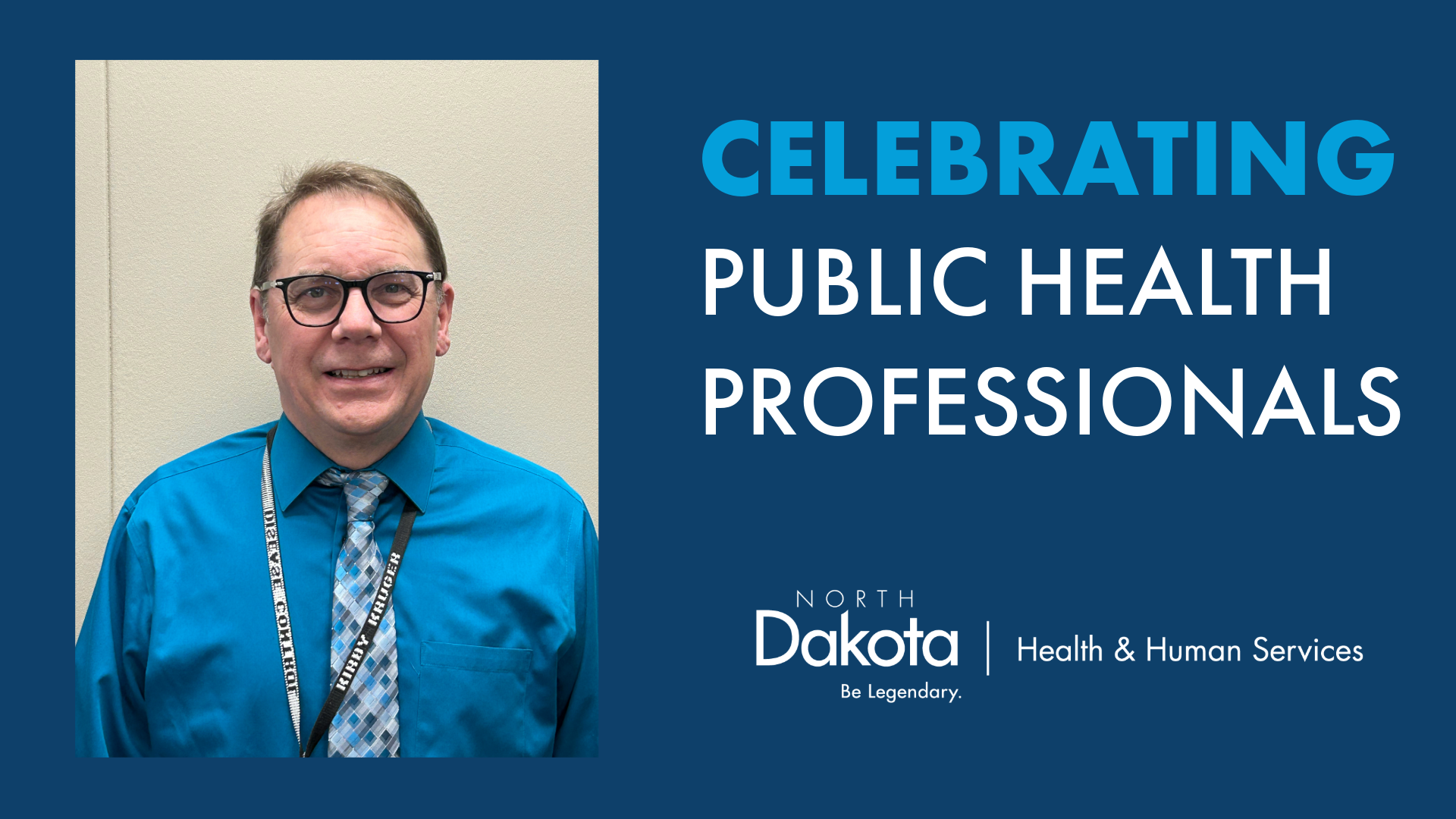Celebrating 36+ years of public health service

Link to video of public health professional Kirby Kruger: vimeo.com/1074770089
On this, the 30th anniversary of National Public Health Week, HHS is highlighting programs and team members who make a difference with the work they do to help North Dakota become the healthiest state in the nation.
Public Health career
Director of Disease Control and Forensic Pathology Kirby Kruger joined the agency in 1989 as an AIDS/HIV educator. This involved working with the general public and health care professionals to educate them about disease transmission and effective prevention strategies.
“At that time, there was still a lot of concern about how HIV was transmitted, and so we spent a lot of time working on reinforcing the facts and that it wasn't a casually transmitted disease,” he said. “At the health care level, I was working with infection control providers and reinforcing the need for standard precautions to protect health care workers and patients from HIV transmission.”
Over the years, Kirby has been able to work in public education and disease monitoring and prevention for different communicable diseases.
“I was learning about new things continually and it was exciting,” he said.
How public health contributes to the public’s health
Public health professionals in Disease Control and Prevention monitor which diseases are circulating, so that they have a better understanding of what the risk for the community may be. They also work to identify the source of a disease to prevent additional cases, Kirby explained.
“We have detected, for example, foodborne outbreaks where we were able to trace it down to events or to products that were being sold. That was always rewarding when we were able to provide answers,” he said.
How public health has changed
“When I started with the department, there was one computer in the whole Disease Control and Prevention Unit, and we shared it when we needed it,” he said.
According to Kirby, the emergence of the digital age has revolutionized how public health professionals collect data and monitor what's happening in our state in terms of diseases. It has also provided more ways to communicate with partners, providers and the public, he said.
What he loves most about public health work
Kirby said there are two key things he loves about public health work.
“Number one, I didn't realize until I started working in public health how important public health was…. It's focusing on communities and groups of people in the population as a whole and preventing disease and determining how to best do that.”
“The second part, was and is the people. I work with a great group of professionals, both above me, below me, and right beside me. And I think it's outstanding to see the passion I see amongst public health people.”
“I think the mission of public health is important…. I'm helping and contributing to a better place — a better North Dakota,” he said.
Accomplishments
Kirby said the biggest accomplishments in public health during his career involved the successful implementation of new vaccines and seeing the public health benefit first hand.
He said, he worked with hepatitis A cases, and North Dakota would have outbreaks every four to six years.
“Once we were able to get hepatitis A vaccinations sort of mainstream — working together with local public health and private health care providers — we saw those outbreaks disappear. It was good to see that.”
Kirby said he saw a similar benefit from meningococcal vaccines introduced during his career that provided protection against bacterial meningitis.
Biggest challenges during career
“I've been through two pandemics now — the first in 2009, when H1N1 emerged, and then the COVID-19 pandemic was the most challenging. It was a brand new virus and the evolution of what we understood about the virus was rapidly changing. And it made for difficulty in putting out consistent communications,” said Kirby.
“We built a very good team very rapidly. It really showed how public health can come together and rise to a challenge. The other thing that was remarkable was the people. Everyone wanted to do what was right and what was best for their communities and for the population as a whole.”
Advice to new public health professionals
Kirby’s advice is: “Follow the science. What's the best science and what makes the most sense? And the more challenging part of it is, how do we reach the communities and populations who are being most impacted by the diseases?... There are disproportionate impacts.”
“Lastly, you have to be in it for the long haul. Generally, there aren't overnight successes in public health,” he said. “To make advances in community health, it takes a program. It takes dedication. It takes patience. If plan a doesn't work, maybe you go to plan b.”
